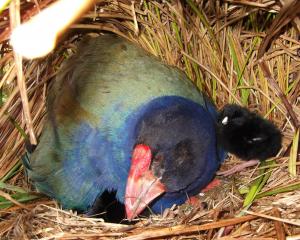Orokonui Ecosanctuary founder and former chairman of the ecosanctuary trust, Raph Allen, warns about the dangers of proposed changes to the trust's constitution. They will be considered by trust members on Thursday.
The proposed constitutional change arises from coercion by the only people it would benefitTHE Otago Natural History Trust (ONHT) operates Orokonui Ecosanctuary.
Local runaka Kati Huirapa Runaka ki Puketeraki accepted an invitation from the ONHT to participate in the establishment of the ecosanctuary in 2002. The runaka has since approved several species translocations and has received cultural recognition throughout the ecosanctuary and land for a pa harakeke (flax plantation) there.
The present ONHT constitution was written in 2004 with the participation of a runaka representative. It was unanimously endorsed by ONHT members at the 2009 annual meeting. It ensures that members control the ecosanctuary's governance through the democratic election of the six trustees.
But now the trust proposes to amend the constitution so that "the board has appropriate expertise to assist it in fulfilling the aims of the Trust Deed" and to "clarify the role of elected members and advisers". The board would have the power to appoint, with safeguards, three unelected trustees.
Until July 2010, no organisation or individual had questioned the role of trustees or sought to change the way they are recruited. The trust already successfully calls on the expertise of special interest groups through appointment of advisers. It recognises special relationships through Memoranda of Understanding; for example with Otago Museum, the University of Otago and NHNZ. So why is the change necessary?
It became an issue because the runaka didn't nominate a candidate in time for the July 2010 trust board election. The runaka manager and the candidate subsequently threatened to withdraw support from Orokonui unless a permanent position on the board was provided for the runaka.
Runaka support is essential to gain Department of Conservation permission for species introductions to the ecosanctuary - irrespective of any ecological considerations - so this is a very serious threat to Orokonui's ecological and financial viability.
To defuse the situation, an elected trustee resigned and the runaka candidate was appointed immediately to fill the vacancy.
However, the demand was not withdrawn. Runaka chairman Matapura Ellison recently reinforced it by stating that runaka support pivots on "formal recognition in the long term" (ODT, June 7).
Evidently the ONHT life membership given to the runaka in 2008 - a privilege not bestowed on any other group - is inadequate, as is the Memorandum of Understanding drafted following Mr Ellison's advice in early 2010 but not yet signed by the runaka.
The runaka has always been free to nominate a candidate for election to the board. Unfortunately, there is evidence that the runaka's demand is motivated primarily by politics and self-interest rather than by concern for the welfare of threatened native wildlife.
Indeed, Kati Huirapa Upoko (leader) David Ellison has called the runaka's action "political moves" and the Kaumatua Council (elders) have dissociated themselves from the demand (ODT June 30). There are other indications too.
Kiwi - Haast tokoeka - are managed at Orokonui under a protocol drawn up between Doc, two iwi (Kati Huirapa and Te Roopu o Makaawhio), and the ONHT. Doc is bound to five obligations, the iwi to three, and the ONHT to 21. Six of these 21 have no ecological relevance at all - they simply compel the ONHT to support iwi cultural ambitions. Another is purely political - the ONHT must acknowledge the principles of the Treaty of Waitangi.
Offspring from the Orokonui kiwi population must always be made available for return to the unfenced Haast Kiwi Sanctuary in South Westland - exactly the area where they have been driven nearly to extinction by introduced carnivores.
The protocol explains why: " ...manawhenua (traditional tribal authority) for Haast Tokoeka resides with Te Roopu o Makaawhio and ... tokoeka will always whakapapa back to their parent population in Haast and within the rohe (traditional tribal area) of Te Roopu o Makaawhio".
Since the ecosanctuary's establishment, the ONHT had been considering reintroducing native buff weka. In 2010 a prominent runaka member, who is also a member of Kaitiaki Runaka o te Roopu Weka (Ngai Tahu weka advisory group), approached Orokonui's general manager and the ONHT chairman to propose that Orokonui Ecosanctuary should instead accommodate hybrid weka, which have no ecological relevance. Why? So that iwi members could "culturally harvest" them.
The ecosanctuary exists for the benefit of the wildlife that was here millennia before humans - not to promote the ambitions of any particular group of people. A permanent ONHT board position for Kati Huirapa Runaka ki Puketeraki - or any pressure group - would improve neither the governance of Orokonui nor the welfare of native wildlife.
The proposed constitutional change arises from coercion by the only people it would benefit - other justifications are simply window dressing. It would reduce the democratic rights of ONHT members.
It could hand precious trustee positions to people with a political agenda who might contribute nothing to Orokonui Ecosanctuary's primary aim the conservation of New Zealand's vulnerable native flora and fauna.
Naturally, ONHT members should be very concerned about the consequences of the withdrawal of runaka support from Orokonui if the runaka doesn't get its way. But members should also question what the future direction of Orokonui Ecosanctuary might be if the proposed constitutional change goes ahead.


